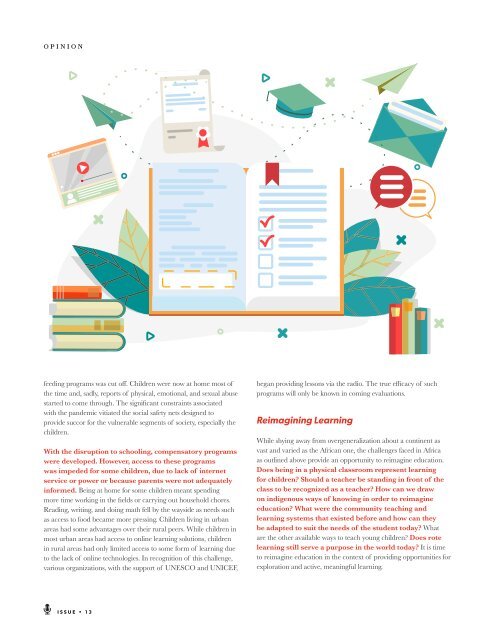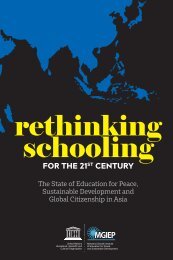The Blue DOT Issue 13
Reimagining Education: Beyond the Rhetoric
Reimagining Education: Beyond the Rhetoric
You also want an ePaper? Increase the reach of your titles
YUMPU automatically turns print PDFs into web optimized ePapers that Google loves.
OPINION<br />
feeding programs was cut off. Children were now at home most of<br />
the time and, sadly, reports of physical, emotional, and sexual abuse<br />
started to come through. <strong>The</strong> significant constraints associated<br />
with the pandemic vitiated the social safety nets designed to<br />
provide succor for the vulnerable segments of society, especially the<br />
children.<br />
With the disruption to schooling, compensatory programs<br />
were developed. However, access to these programs<br />
was impeded for some children, due to lack of internet<br />
service or power or because parents were not adequately<br />
informed. Being at home for some children meant spending<br />
more time working in the fields or carrying out household chores.<br />
Reading, writing, and doing math fell by the wayside as needs such<br />
as access to food became more pressing. Children living in urban<br />
areas had some advantages over their rural peers. While children in<br />
most urban areas had access to online learning solutions, children<br />
in rural areas had only limited access to some form of learning due<br />
to the lack of online technologies. In recognition of this challenge,<br />
various organizations, with the support of UNESCO and UNICEF,<br />
began providing lessons via the radio. <strong>The</strong> true efficacy of such<br />
programs will only be known in coming evaluations.<br />
Reimagining Learning<br />
While shying away from overgeneralization about a continent as<br />
vast and varied as the African one, the challenges faced in Africa<br />
as outlined above provide an opportunity to reimagine education.<br />
Does being in a physical classroom represent learning<br />
for children? Should a teacher be standing in front of the<br />
class to be recognized as a teacher? How can we draw<br />
on indigenous ways of knowing in order to reimagine<br />
education? What were the community teaching and<br />
learning systems that existed before and how can they<br />
be adapted to suit the needs of the student today? What<br />
are the other available ways to teach young children? Does rote<br />
learning still serve a purpose in the world today? It is time<br />
to reimagine education in the context of providing opportunities for<br />
exploration and active, meaningful learning.<br />
As an avid appreciative inquiry practitioner, I wonder if these<br />
questions are being taken back to the families and communities<br />
by local and international development partners. How can<br />
communities be involved in this process of reimagining? How<br />
do they see the child of today being an active and contributing<br />
member of their community years down the line? What are the<br />
community needs that education can lay the groundwork for<br />
addressing by future generations? Can a child access technologies<br />
to follow the weather and changing climatic conditions in their<br />
community? Can she access pricing information from the grain and<br />
vegetable markets? Students should be technologically proficient,<br />
able to use the internet for learning that is relevant to their lives.<br />
Yet access to the internet is still problematic, and so it is also<br />
important to explore other ways of learning that do not rely on<br />
a live internet connection. It is time to strongly consider and<br />
implement offline learning solutions.<br />
Offline Learning systems<br />
Offline learning can provide children living in resourcestressed<br />
communities access to digital educational<br />
content that can be made available to users without the<br />
need for frequent external interaction. Children without<br />
access to a classroom or an active internet connection would still<br />
be able to learn through text-based or storage play back learning<br />
solutions. This means packaging learning activities and loading<br />
them onto solar-powered tablets that will be used by children and<br />
community members, with support from teachers. With such tools,<br />
parents and caregivers in resource-constrained environments are<br />
able to support their children’s learning, using tablets that give them<br />
the ability to walk through the learning content.<br />
Offline learning can provide children living<br />
in resource stressed communities access<br />
to digital educational content that can be<br />
made available to users without the need for<br />
frequent external interaction.<br />
REFERENCES<br />
1. https://au.int/en/documents/20200724/africas-governanceresponse-covid-19<br />
2. https://au.int/en/newsevents/20201016/african-union-aucovid19-response-fund-launch-300m-fundraising-help-tackle<br />
<strong>The</strong> content itself can be developed using the curriculum as set<br />
by the ministry of education in any particular country. Teachers<br />
can visit the villages to check on students’ progress and spend time<br />
mentoring and coaching as needed. Remote and hard-to-reach<br />
communities can access educational content on the learning tablets.<br />
<strong>The</strong> frequency with which members of the community may need to<br />
travel to access educational resources can be minimised.<br />
As these offline technologies are deployed, we must be sensitive to<br />
the possibility that users may never have interacted with computer<br />
technology. Providers must think through ways to provide training<br />
and enhance the capacity of tutors to be able to support learners<br />
using these digital learning technologies. <strong>The</strong> immediate benefit<br />
will be an improvement in digital literacy within communities,<br />
which then will have potential spinoff benefits such as greater<br />
access to education, health care information, and financial services.<br />
While digital literacy has been linked primarily to active internet,<br />
educators, governments, and development partners need to explore<br />
technologies that don’t require constant internet connectivity. Only<br />
then can we ensure that unconnected populations in developing<br />
countries have access to learning and vital information.<br />
Conclusion<br />
<strong>The</strong> COVID-19 pandemic has presented opportunities to consider<br />
education as it once was and imagine what it can be in the future.<br />
It is possible that the traditional classroom-based instruction will<br />
be insufficient for our needs, and remote-based offline technologies<br />
will become more and more relevant. This is an opportune<br />
time for reimagining education together with the children<br />
and their communities so that the new ways of learning<br />
are inclusive and embrace the daily realities faced by<br />
children. Equally important is to find sustainable ways to increase<br />
access to these technologies for communities living in hard-to-reach<br />
areas. Moving ahead, countries in the Global South should explore<br />
strategies that bridge the digital divide that exists between urban<br />
and rural communities in accessing the internet and other offline<br />
learning technologies.<br />
3. voanews.com/covid-19-pandemic/nigerians-justify-massive-lootingcovid-19-supplies<br />
4. https://en.unesco.org/covid19/educationresponse<br />
OPINION<br />
ISSUE • <strong>13</strong><br />
3 1

















